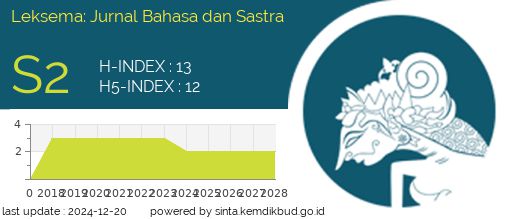WOMEN STRUGGLE IN 'A MIDSUMMER NIGHT'S DREAM' : DE BEAUVOIR'S FEMINISM PERSPECTIVE
DOI:
https://doi.org/10.22515/ljbs.v2i2.929Keywords:
women, struggle, feminismAbstract
A Midsummer Night’s Dream is one of Shakespeare’s comedies assumed to be written between 1590- 1597. It can be regarded as one of the comedies because it is full of silly funny things and also has a happy ending although there is seriousness within the work for instance the representation of patriarchal society. This paper aims at describing the women's struggles in the play based on the theory of Simon de Beauvoir regarding the situation of married woman to see the phenomenon found in the work better. As the result of the analysis, it can be concluded that there is a gender awareness which has been presented by Shakespeare in A Midsummer Night’s Dream. He shows that there is gender difference in the play presented by the male and female characters in a restricted patriarchal society of Athens.
Downloads
References
Bennet, Andrew & Royle, Nicholas. 2004. Introduction to Literature, Criticism and Theory: Third Edition. London: Pearson Educated Ltd.
de Beauvoir, Simone. 2011. The Second Sex (Vintage Book Edition). New York: Random House
Eales, Jacqueline. 2005. Women in Early Modern England, 1500-1700. London: Taylor & Francis
Fakih, Mansour. 2008. Analisis Gender dan Transformasi Sosial. Yogyakarta: Pustaka Pelajar
Shakespeare, William. 1966. Shakespeare Complete Works. Oxford: Oxford University Press
Wolfreys, Julian et. al. 2006. Key Concepts in Literary Theory. Edinburgh: Edinburgh University Press
Downloads
Published
Issue
Section
License
The copyright of the received article shall be assigned to the publisher of the journal. The intended copyright includes the right to publish the article in various forms (including reprints). The journal maintains the publishing rights to published articles.
In line with the license, the authors and users (readers or other researchers) are allowed to share and adapt the material only for non-commercial purposes. In addition, the material must be given appropriate credit, provided with a link to the license, and indicated if changes were made. If authors remix, transform or build upon the material, authors must distribute their contributions under the same license as the original.






